An Interview With University of Notre Dame Coach Geoffrey McCuen
by Rob Dinerman for DailySquashReport.com
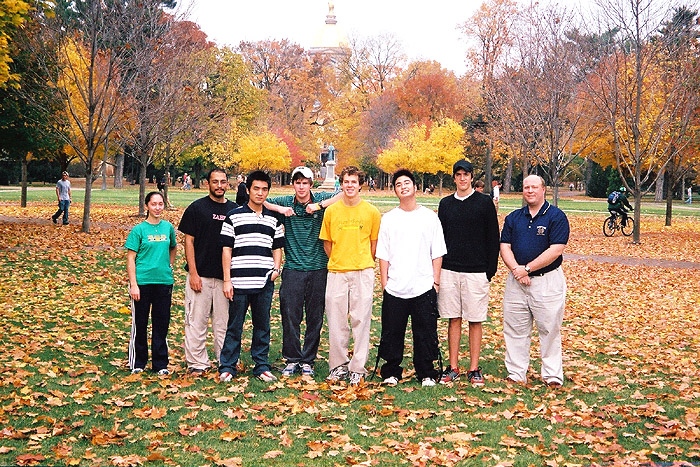
Posted August 22, 2011
Dinerman: Coach McCuen, tell us what it is like running the squash program at a college that has a massive profile in major sports like football. Does that make it harder to have squash break through and attract the interest and attention of the student body?
GM: It’s probably similar to what “ordinary” people feel when you have a very “famous” sibling. When we travel for matches we wear Notre Dame warm-up suits. When people see us in the airport or at a restaurant they often stare and even approach us for an autograph or photo. Then, when they realize we are the squash team, you can see both a look of confusion (“Squash?”) and look of disappointment. But they usually go ahead with their request. We really get a kick out of it.
Football and Basketball aren’t our biggest problem. The Notre Dame school paper (The Observer) and other campus outlets do a very good job of giving attention to sports other than the nationally recognized ones. Our campus competition for promotion is that Notre Dame is blessed with many very successful Club Teams. So while few of us make the front-page of the sports section, we compete with the Rugby Team, Sailing Team, Crew and Women’s Ice Hockey. But our biggest problem is lack of general “squash knowledge” among today’s students. We find it’s usually harder to get students to let us explain the game than to get them to try it once they know what it is. We often sell it as, “Very similar to racquetball, but much more fun!”
The big advantage to having a squash team on a campus like Notre Dame (lots of very bright students, mostly in pretty good physical condition) is that when we get players – they really can play! Squash is a game that is pretty demanding on both your body and your mind, and ND students are perfectly suited for this. This has been a huge help when we have first-time players join the club and who want to play in CSA competition. They can really “hit the court running” after a few lessons on the basics of the rules and technique.
Dinerman: What is the squash court situation at Notre Dame and how have you
been going about building interest and identifying and recruiting players among the undergraduate student membership?
GM: Notre Dame has a historic (i.e. “old”) athletic building called the Rockne Memorial Building that was designed with two banks of seven courts each! However, the building was built in the 1950’s so they are 18 1/2-foot North American hardball courts. Many years ago when squash started to give way to racquetball, most of these courts were repainted and relined to “look like” a racquetball court (despite being 8 feet too short and 1 1/12 feet too narrow!). Five courts were lined for both racquetball and hard-ball squash. Then four years ago I was able to get these five courts repainted to “look like” international soft-ball courts (despite being 2 1/2 feet too narrow). Then, in the summer of 2010 two proper racquetball courts (20 feet wide) in the Joyce Center (where the basketball team plays) were remodeled with new walls, including a reinforced glass back wall at 32 feet, and lined for soft-ball squash. There are still two other hard-ball courts in the Joyce Center as well. So that gives us seven 18 1/2-foot courts and two 20-foot courts. However, there is hope that before (recreational sports director) Dave Brown leaves Notre Dame we’ll see a bank of at least five new 21-foot courts be built on campus.
Fortunately, the Rockne Building is very popular with the students looking to work out, so we get a lot of kids who came to lift weights, shoot hoops or rock climb, and ended up trying squash.
Dinerman: How have the perspectives of coaches you have worked with at summer squash camps influenced the way you coach at Notre Dame? You mentioned for example that you have worked with Gail Ramsay at Princeton, which won the national championship several times in recent years. You also have said that at one point you worked closely with former Navy coach Dave Brown.
GM: This is a very interesting question and issue. Without question both Gail and Dave have been great sources of “technique knowledge”. I learned so much in my week at Princeton about how I can do a better job of “teaching” (demonstration technique and ball-feeding technique) squash to new players. Dave has been a great source of information about “strategy”. He shared a lot of great tips before we made our first trip to the National tournament. However, what I find has been most helpful in my time at Notre Dame are lessons I learned in my “real job” – Human Resources Management. One of my biggest needs has been recruiting players from our own campus – not from High Schools. I always have to think of new and creative ways to find a student who has some competitive drive and racquet skills but isn’t already on the tennis team, or never knew about squash. Then when they show up for the club practice, I’ve got to keep them entertained. In years when I’ve put too much focus on drills and fine-tuning skills the kids have left in droves. So, I’ve had to learn how to keep the kid who only hits the ball 1-in-3 swings encouraged and coming back every week – while also teaching and coaching enough for the top players so that they do the same.
Dinerman: You mentioned that at one point a former member of Singapore’s
National Junior Team played in your program at Notre Dame. Who was this player and what influence did his time on your team have on the program?
GM: His name is James Zhang; he was Notre Dame class of 2007. He was one of the top junior players in Singapore and represented Singapore in regional and international U-15 and U-17 tournaments. When he came to Notre Dame he didn’t even know that there was a squash club his freshman year. So we didn’t meet him until the start of his sophomore year, but in the three years we did have him he made a huge impact. Most significantly, he had a magnetic personality and he lived and breathed squash! So he was constantly talking it up with everyone he met on campus. The squash club grew more in his first two years that it has since he left. He even helped to bring in a female player, Kristine So, in his Junior year. Kristine was almost his female equivalent and she then helped to form a women’s group large enough to send a full 10-woman team to the Nationals in her Senior year. James and Kristine were both excellent players in their own rights and very willing to work with newer players, while still working on their own games.
Dinerman: When you were growing up in Indianapolis, did you ever play or take lessons at the Indianapolis Athletic Club under their well-known longtime head pro Jim McQueenie? That club hosted a World Pro Squash Association tournament in 1981 and several years before that Indianapolis hosted the U. S. National Doubles championships. Did you see any of the matches in those tournaments?
GM: I did know Jim McQueenie. However, we did not meet until I was in college at Purdue. On at least two occasions a group of us from Purdue drove down to the IAC to play a group of their players. I really wish that I had met him much sooner, and had stayed in touch with him much longer. He was such a likeable guy. I’m sure I could have learned a lot from him. Interestingly, I think I have two other connections to him (indirectly). My grandfather, Marshall McCuen, who taught me to play at a YMCA in Indianapolis, had been a member of the IAC and both he and my father, Stephen McCuen, knew Jim and had played with him. Then when I got back into the game in northern Indiana, I met Jim Wellington in Goshen. I learned that Jim had grown up on the north side of Indianapolis and had learned to play squash at the IAC with McQueenie.
Dinerman: Your Notre Dame squad won the Emerging Teams division at the College Squash Association team championships some years ago. What are your realistic aspirations for the program during the next four or five years?
GM: Notre Dame’s highest national ranking was at the end of the 2005-2006 season (our second trip to Nationals). We won the “Emerging Teams” division (that year the lowest lettered division was “E” (Chaffee Cup). The best part was that we had to play our traditional football rival, USC, for the title – and we beat them! That year James Zhang had a few other strong players from Guatemala and Mexico on the team with him. As these players graduated, their replacements were not as skilled, and our ranking slipped each season. This year I am very hopeful that we could have one of our best seasons. We only graduated one player, and he played at #8/#9 for us. We have back a good and improving player, in Ryan Gisriel, and we have an incoming Freshman named Mike O’Neill, who played for Malvern Prep near Philadelphia. We also get back a solid player in the middle of our lineup, Dennis Grabowski, who was out most of last season for a semester in Washington DC.
Dinerman: How are you enjoying living in South Bend and in what ways would that experience resonate your years as a collegian at Purdue in West Lafayette, Indiana?
GM: I like living in South Bend. The local area has just enough to do that you don’t feel completely in the “boonies”, but we are only 45 minutes from the
beaches of Lake Michigan, 2 hours from downtown Chicago, and 3 hours
from either Indianapolis or Detroit. We have a regional airport with
pretty frequent flights to the major hubs, and we are right on the
I-80/90 toll road, so we can get to anywhere we need to go pretty easily.
As for Purdue, I loved it! Great campus, great small town community – just
45 minutes from Indianapolis. In the 1980’s there were still a number
of people playing squash in the Co-Rec. Now, I hear that it’s just
the squash club – no faculty/staff. I love the campus and enjoy going
back. It’s big enough to know that you are on a major university
campus, but you can still walk across it in under 15 minutes. My
friends at IU, Michigan and Ohio State all had to take a bus from one
class to another.
Dinerman: Do you go to the ND football games?
GM: Occasionally. They have a great stadium with lots of history. But as I still bleed Black & Gold (for Purdue) it’s tough for me to root for ND teams other than the squash team. In fact, that’s a funny story. The very first competitive match that I coached in at ND was against the Purdue team. It was KILLING me to yell, “Go Irish! Beat the Boilers!”, but I did it. Since then, I’ve met so many fantastic kids and staff at ND that I can cheer for them easily.
Dinerman: How do the football fan bases compare between Purdue and ND?
GM: Purdue football fan base seems to be mostly loyal ALUMNI who “travel in” from all over the country, mixed with some locals who support the team. ND football fan base seems to be almost exclusively die-hard FANS who “travel in” from all over the country, BUT who never attended a single class at ND. Yes, they have many very loyal alumni who come back for the games, but of the many games I’ve been to, and the many tailgates as well, most of the people you meet never went to ND, they are just “fans”. At Purdue, if the person you’re talking to didn’t go to school there, then they probably live within 30-45 minutes of West Lafayette.
Dinerman: What is the best thing about being a college squash coach?
GM: Helping young players get “hooked” on this great game so they can go out into the world and help “evangelize” to the masses! But a close second is the opportunity to work with so many other awesome coaches. From my very first trip to the CSA Nationals I have been so impressed with the people that we have coaching squash at colleges across this country. From small Northeast Liberal Arts schools to major State Universities, everyone has just been so wonderful to learn from and share ideas with. I came into this coaching position without a clue what I was doing, and I really feared being treated that way, but without good cause. I was made to feel as if I truly belonged among them from day one. What a great group!
Dinerman: What was it like growing up in Indianapolis? Has the city changed?
GM: Indianapolis is the most under-rated and under-appreciated city in America. By population it is the 11th largest city (not “metro area”) in the country, but you’d never know it by the amount of mention it gets in the National media. Why? Because it doesn’t generate the kind of negative stories that the news loves. Crime rate and cost of living are much lower than cities near its size. It has a Super Bowl champion football team (and stadium) and an NBA team – but is also home to the RCA Tennis Championships, past and future PGA Golf Championships, one of the top natatoriums (swimming pools) in the country and some great museums. The Broad Ripple area and “Mass Ave” are vibrant night spots for food and drink. There are several theaters for top of the line shows and artists. I think hosting the Super Bowl next January will help to show off the city. And hosting the NCAA Final Four every four years (as the NCAA Headquarters are there) also helps. But it doesn’t have a coast line and it doesn’t have a mountain – that’s really what kills it. Too bad. Great place to raise a family!
Dinerman: What do see as the difference between your experience coaching at Notre Dame and the experience of a coach at a traditional east coach squash-power school?
GM: Never having coached at any other school, I am only able to guess. I would guess the biggest difference is the amount of pressure and responsibility placed on me. As a volunteer club-level coach I think that ND is just glad that I’m willing to do it (but not glad enough to give me an on-campus parking permit!). As a paid varsity coach at one of the “power schools” I would assume you have much more responsibility and more is expected of you. Producing budgets, fund raising, NCAA rule enforcement, winning!, etc. Basically, as long as I make sure the kids have a good time and I get them home safely – I’ve done my job. Which is the sad part about seeing the club grow at ND. Although it is my hope and goal that we will have a bank of new squash courts at ND in the next 5 years, and we could get closer to being a varsity program, I know that means my days as their coach are limited. Soon they will need someone with more skill and ability than I have. But it will be the first time I ever felt good about being let go!
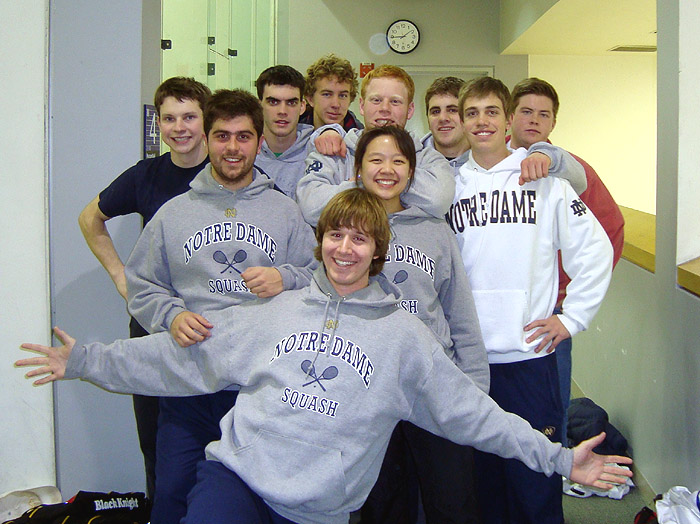
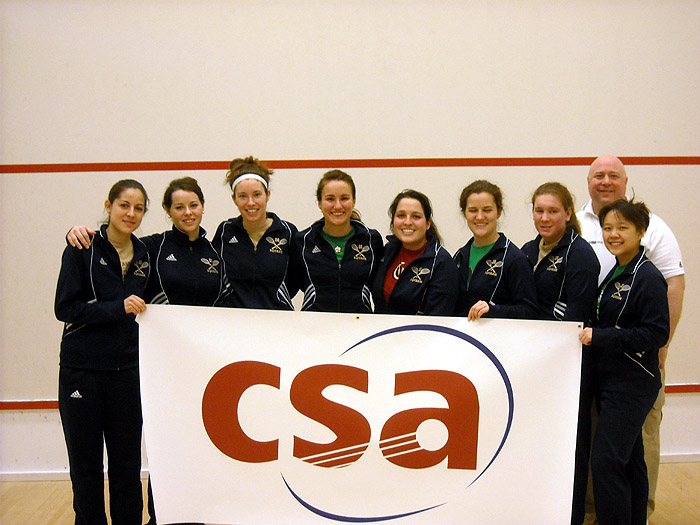
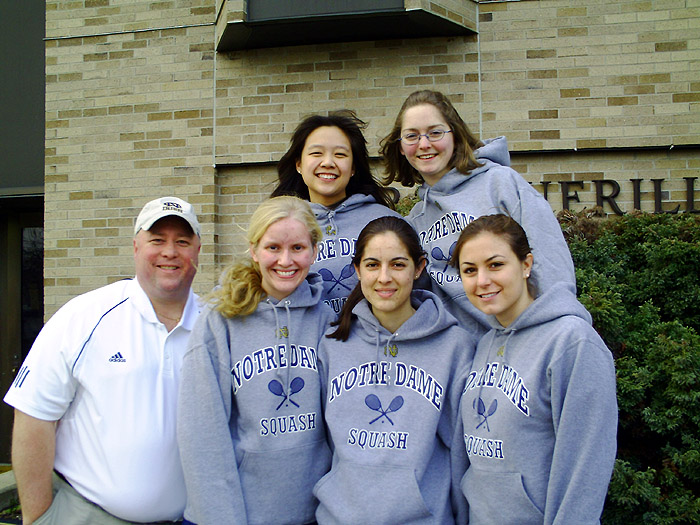
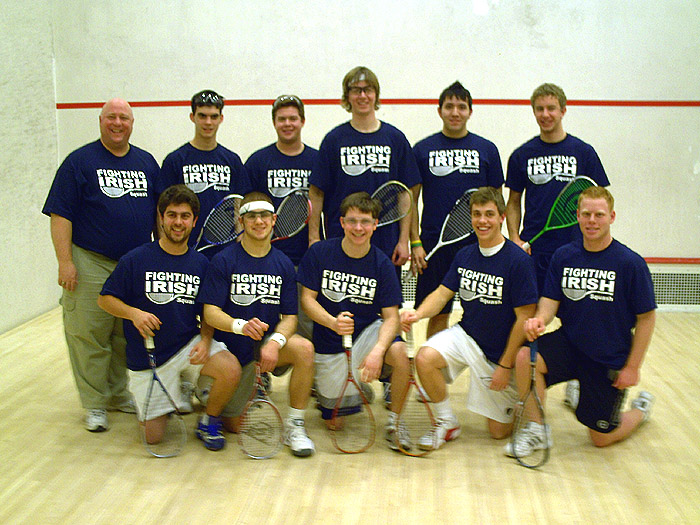

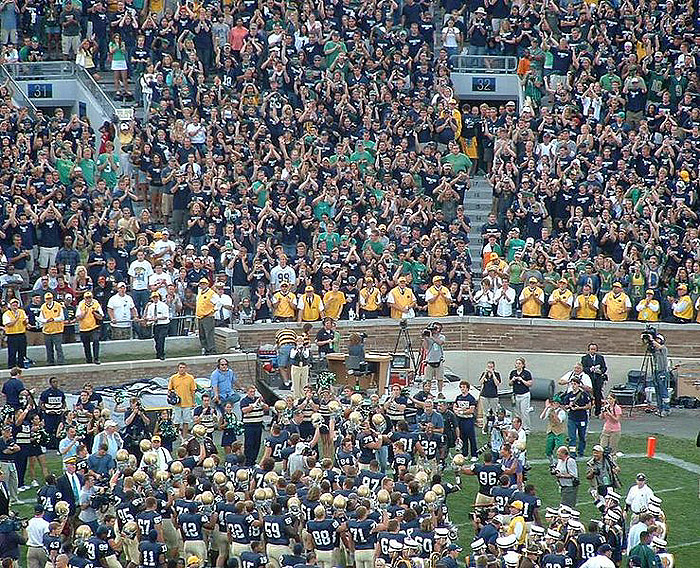
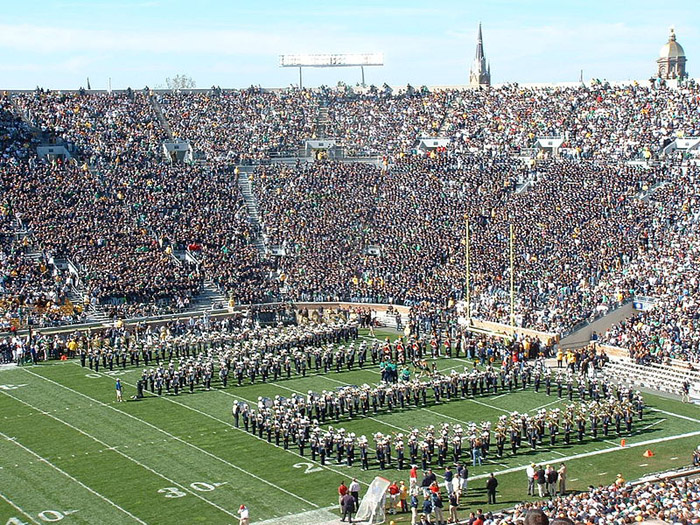
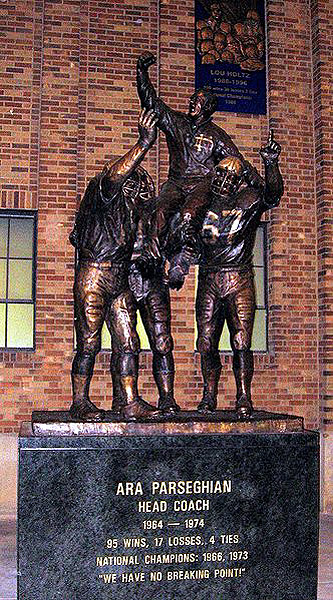
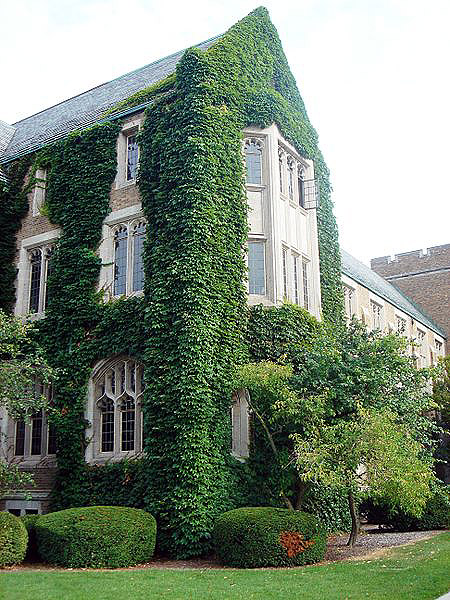
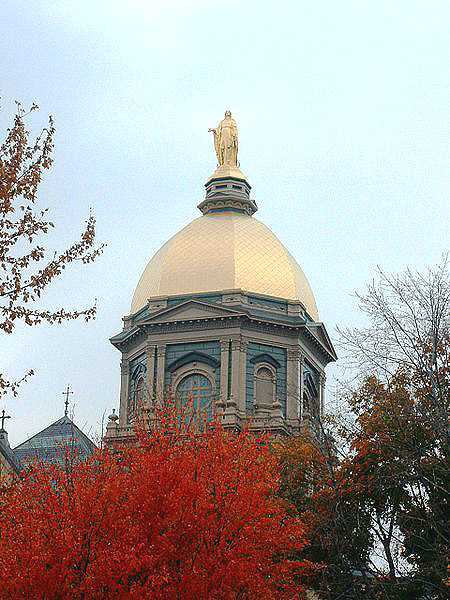

Back To Main
